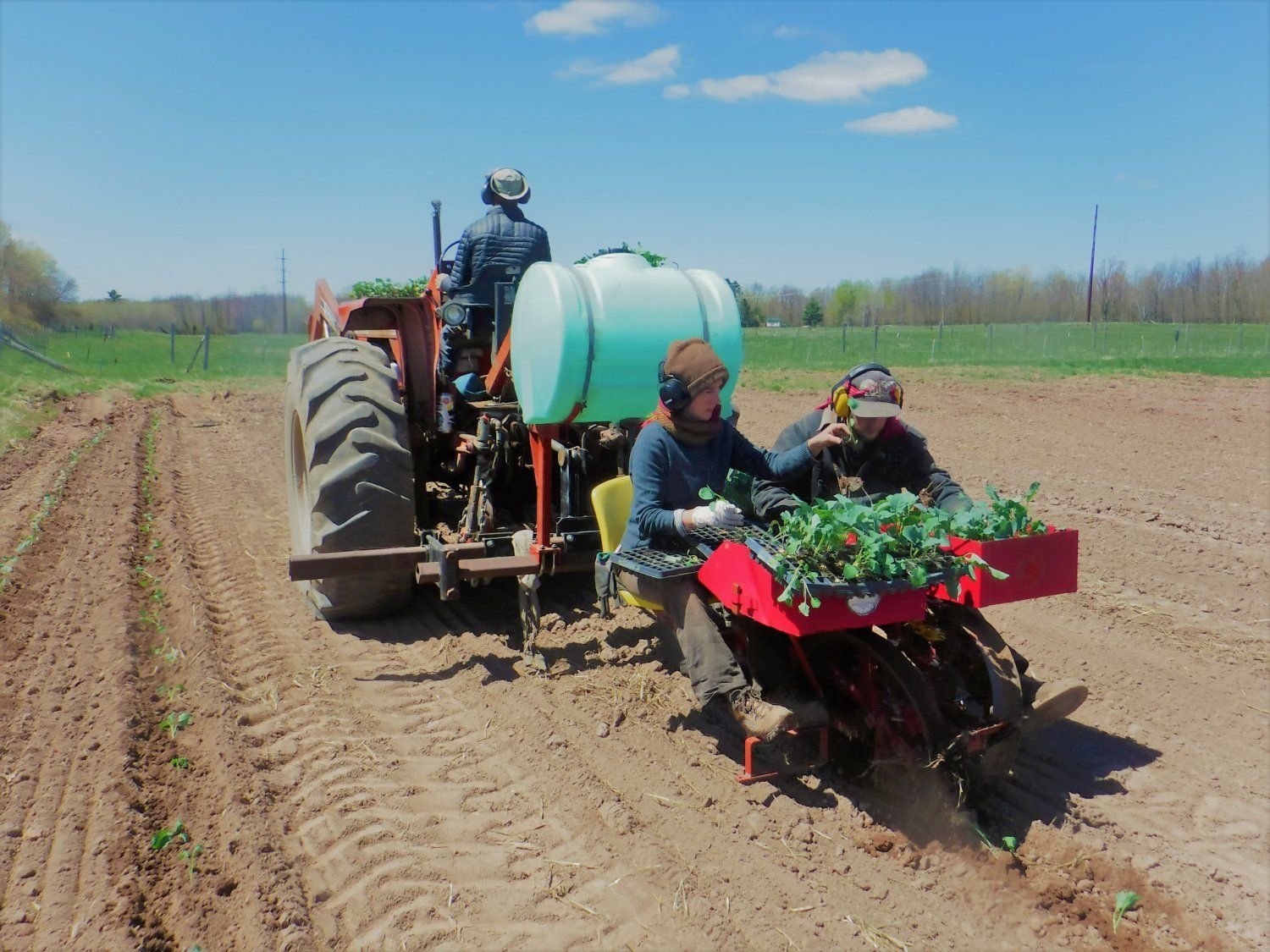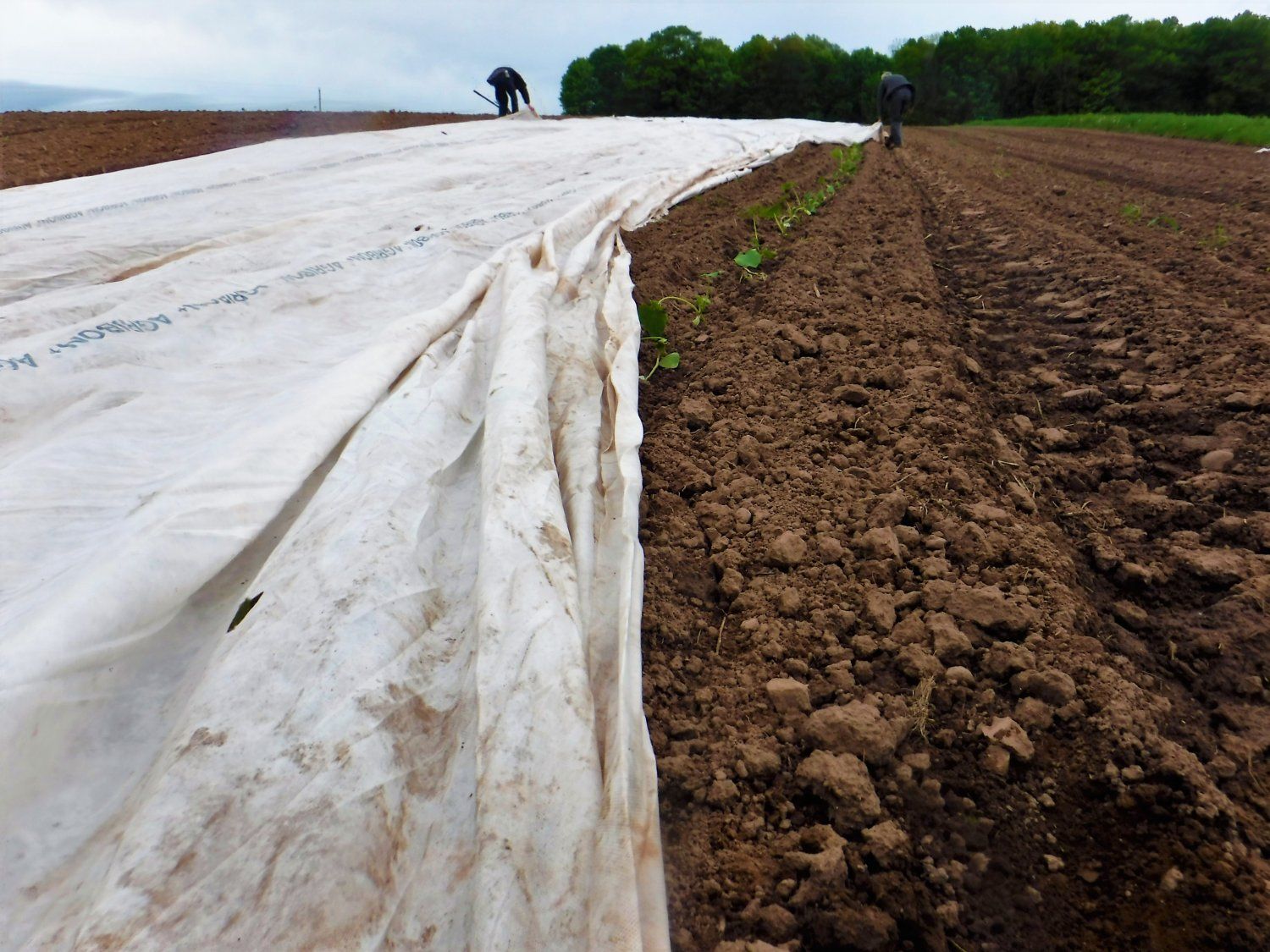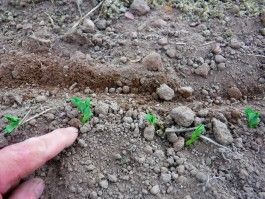With all of the the warm sunshine and the gentle rain, we've got lots of good news to share this week! The crops are growing well out there.
Every year, no matter how long we've been farming, the miracle of seeds germinating never ceases to amaze me. It has been SO incredibly dry (until yesterday, thank goodness) that I was beginning to wonder whether our direct seeded crops like peas and carrots would even begin to sprout without some help with additional irrigation. Fortunately, our peas are planted close enough to the house that we could reach them with a hose, so we irrigated the beds 3 times for 24 hours since seeding a week ago. Even still, the soil was drying out really fast with this incredible summer-like weather, and I had my doubts that germination would be as good as we would like it to be, and yields might be reduced. But then, they sprouted! And the germination looks perfect - a pea about every inch or so in the row. We're really looking forward to a good harvest of peas as the season progresses, and expect harvests to begin sometime in July.
The carrots germinated earlier this week as well, and despite getting zero irrigation (they are in a field located too far from the house to get a hose to) they look awesome! If all goes according to plan, we'll be digging these carrots up and sending them out in the CSA boxes in mid-late July.
In order to improve germination, we roll the beds with a cultipacker behind the tractor to pack them down right after seeding. This helps create better seed to soil contact, so that moisture in the soil (even when there is only a little bit of moisture like this year) can soak into the seed and start the germination process.
We did a good job of prepping the field last fall to get the weeds out, and it sure is nice now to see the long straight rows of carrots coming up in nice clean beds. Once the soil dries out a little after this rainy spell, we'll begin cultivating them with the tractors to keep the weeds at bay. The best time to get a crop weeded is actually before you see any weeds coming up. If you stir the soil, you will see the white threads of newly germinating weeds just beneath the surface. At this white thread stage, it doesn't take much disturbance to kill the weed. Once they get growing, they have leaves (solar panels) and roots (anchors) to help keep them established, and they are much more difficult to keep in check.
We've got good news on the squash front, too. It appears that we did indeed catch all the rodents that were snacking on our squash seeds before they germinated, and both the reseeded squash and the squash that they didn't eat are growing well now. We have 4 racks of squash in the greenhouse that are ready for transplanting as soon as the ground is dry enough again. In addition to our regular varieties of delicata, butternut, and black acorn squash, we've started a bunch of speckled acorn squash (thanks to a suggestion from one of our CSA members!) as well as more green "sweet mama" and red "sunshine" squash, both of which were a hit last fall with their smooth and sweet flesh. We also started some spaghetti squash this spring, so if that's a fav of yours, keep an eye out for them this fall as an option for your CSA boxes.
In order to get ready for transplanting, we subsoiled the squash beds with this giant 3-shanked implement. The shanks are up right now for the picture - when the implement is in use, they are mostly buried and stick about 18-24 inches into the soil. The big shanks loosen the soil gently and deeply in the bed, allowing plants to easily send roots deep into the soil to access moisture during dry spells. This implement is part of our "irrigation" strategy for most of the crops we plant, from sweet corn to broccoli to squash, and since we began using it we have seen great results from a plant-health standpoint. We also have found more giant rocks than we'd care to recall, like this one that the subsoiler unearthed yesterday! Most of the rocks are small enough that a person or two can roll them out of the bed, but every year we find a few that have to be dug out with the front end loader.
Also this week, we got a brand new rear tire on the tractor. Our old tire (probably 30 years old) had been cracking worse and worse each year, the tread worn down smooth from decades of use. I have been watching it slowly degrade, and wanted to replace it on my own time before it failed instead of trying to get a few more months or years out of it. You can see in the picture the cracks developing in the rubber, some of which were over a half inch deep. I am sure it would have failed while we were out doing some job with the tractor, and between waiting for a new tire to arrive and a tire technician to schedule a replacement visit, we'd have lost 2 weeks of tractor time. No good. So, we bit the bullet and had it replaced this week on Wednesday after work. Getting a big tractor tire replaced is a pretty pricey endeavor, and usually costs just shy of $2,000... about a quarter of the price of the entire used tractor. The tires are filled with fluid to help give them more weight and traction, so that fluid needs to be pumped out and replaced as well. A few years ago, we replaced the other rear tire on this big orange field tractor, so hopefully (fingers crossed) we are good for another 30-40 years before we have to replace either rear tire again.
Finally, during these last few rainy days, we've been working in the hoophouses finishing up the tomato trellising, and we're nearly done! Here's to fresh, ripe tomatoes sometime in July if everything goes as planned!
This will be the final week of the spring farmstand season, and we're really looking forward to the start of the summer CSA season on the first week of June! In addition to loads of delicious microgreens (including lots of delicious basil micros!) the first harvests from our hoophouses will be available as well: green top beets, swiss chard, collard greens, scallions, and of course spring spinach. And that's just from us here at Great Oak Farm - there will be lots more from all the other farms and food producers in our cooperative as well!
If the summer CSA veggie boxes sold out before you were able to sign up, don't worry - we've got a mid summer Peak Season option that you can hop in on. We'll also be offering the week-by-week Farm Stand option as well whenever harvests are bountiful enough to supply a few more folks with fresh local veggies.
Thanks so much for making us YOUR farmers, and we can't wait to get the regular summer CSA season rolling!
In community,
Farmer Chris
Great Oak Farm

.JPG)
.JPG)
.JPG)
.JPG)
.JPG)
.JPG)



